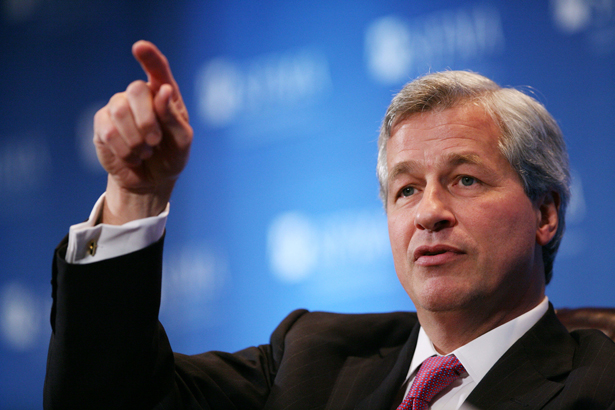
James Dimon, chairman and CEO of JP Morgan Chase & Co. (AP Photo/Mark Lennihan)
The problem with a super-smart banker like Jamie Dimon, CEO of JPMorgan Chase, is not just that his bank makes risky bets with its own money. The real scandal is that Dimon’s hot-shot traders are gambling with our money. If their complex derivatives deals should go horribly wrong and lead to the megabank’s failure, the taxpayers are on the hook to clean up the mess.
That is because JPMorgan Chase shrewdly parks virtually all of its vast derivatives holdings in its commercial bank subsidiary. In the event of a collapse, the bank can use its deposit base to pay off the derivatives, while leaving the Federal Deposit Insurance Corporation to reimburse depositors if their money runs out. This is not a trivial technicality. JPM is the world’s largest purveyor of derivatives. Its total contracts have a notional value of $72 trillion—and 99 percent of them are booked at its FDIC-insured bank. In the event of failure, sorting out the claims and counterclaims will be a costly nightmare for the FDIC. The bulk of the contracts are “plain vanilla” derivatives used as standard hedges against price or currency changes. The exotic derivatives, however, are dangerous—the kind that suddenly blew up in Dimon’s face some weeks ago, when his bank swiftly lost at least $3 billion on one complicated market gambit, with maybe more losses to come.
We are “insuring” other big boys of banking in the same way. Citigroup has nearly all of its $53 trillion in derivatives in its FDIC-insured bank; Goldman Sachs has $44 trillion parked at an FDIC-backed institution. After Bank of America purchased Merrill Lynch, BofA began transferring the securities firm’s derivatives to the FDIC-insured bank, which now holds $47 trillion in contracts. When Senators Sherrod Brown and Carl Levin, among others, complained that regulators’ acquiescence in these transfers contradicted Congressional instructions in the 2010 Dodd-Frank reform law, the Federal Reserve, the FDIC and the Treasury Department’s Office of the Comptroller of the Currency refused to answer their objections. This matter involves “confidential supervisory” and “proprietary business information,” the three agencies responded in unison.
But it also involves a political scandal—the corruption of a successful government program created during the New Deal to prevent panicky bank runs. The FDIC was designed to protect the savings of mom-and-pop depositors, not the balance sheets of mammoth financial institutions; and so far it has worked. Sheila Bair, former chair of the FDIC, regrets how the big boys have twisted it to their own purposes. “None of these guys would be around if it weren’t for the insurance fund,” she told me. “So they do have an obligation to use the insurance in a prudent way.”
Popular
"swipe left below to view more authors"Swipe →
Led by Brown and Levin, ten Senate Democrats protested in a letter this past fall to the Fed and other regulators that allowing BofA to transfer derivatives to FDIC-insured status lets the bank increase its credit risk rather than its capital. “These potentially risky, largely over-the-counter transactions are now being directly backstopped by the FDIC’s Deposit Insurance Fund—and ultimately the United States Treasury,” the senators wrote. “This provides an additional safety net subsidy for one of the biggest derivatives dealers that is contrary to…the Dodd-Frank Act, but also the original intent of the Federal Reserve Act and the Federal Deposit Insurance Act.”
Maybe this is what the Fed had in mind—boosting profitability for troubled megabanks. During the height of the crisis, the Fed instantly altered reality by allowing Goldman Sachs (along with Morgan Stanley) to convert from an investment firm to a bank holding company. A small industrial loan company in Utah with meager deposits of $23 billion was reorganized as Goldman Sachs Bank USA—holding trillions in derivatives, and now FDIC insured. The change guaranteed Goldman’s access to the Fed’s various short-term lending programs. Goldman became one of the heaviest borrowers, at some $814 billion.
As Bair explained, the special status of insured banks has advantages for bankers’ bottom line. The federal insurance supports a higher credit rating, which means the bank enjoys cheaper credit when it borrows and lower margin requirements if it is buying or selling derivatives contracts. Regulators, including the FDIC, accommodated too easily. “You know, I think everybody kind of got enamored with this golden age of banking,” said Bair.
Despite the efforts of Congress, Dodd-Frank did not fix this problem. The law sets limits on how much banks can book their derivatives at their insured subsidiary, but the Fed found ways to get around this with waivers or exemptions. Since JPMorgan Chase had always parked derivatives under FDIC protection, rival banks complained that it had a competitive advantage. Regulators gave in to their argument.
“So the whole thing kind of fed on itself,” Bair said. “I would really like to see a restructuring…to require these bank holding companies to move all this stuff—the derivatives, the trading, the market-making—out of the insured bank and put in the securities affiliate…. And require higher capital reserves, not lower, for the securities, because they involve higher risk…. It used to be banks would take their excess deposits and buy government securities. Now they are taking greater risks…. We provide insured deposits so banks can make loans. That’s what it’s for.”
Bair insists the Federal Reserve and other regulators have the authority to restore the insurance system on their own, in the name of protecting the safety and soundness of the banking system. More likely, Congress will have to try again to enact stronger reform legislation, even as bank lobbyists work to undermine it. Either way, somebody is going to have to take on Jamie Dimon and his banking friends. If neither Congress nor the Federal Reserve has the nerve, the bankers could be setting us up for an even uglier crash.


